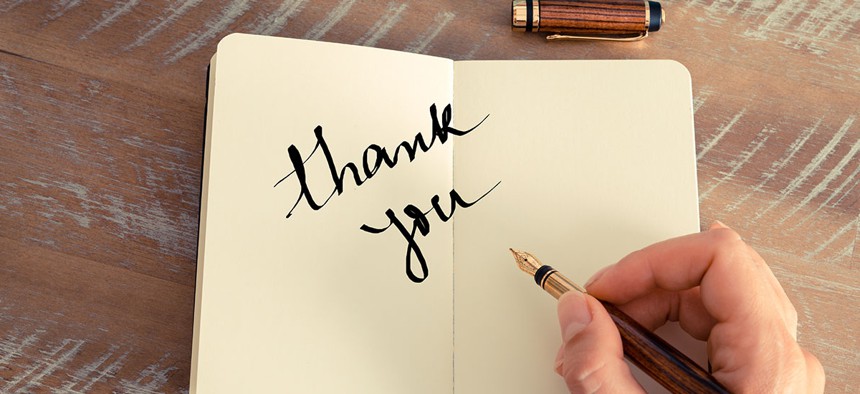
Shutterstock.com
A New Study Shows You’d Be Crazy Not To Send A Thank-You Note Post-Interview
People routinely underestimate the power of gratitude.
Most adults at least think to send a thank-you note after an important interview. But life moves fast, and forgetting to actually do so is easy. Plus, in a professional context, it’s hard to know when a note will be appreciated, or overkill. Then there’s the whole “I’m a bad writer” concern, which can be paralyzing for people, leaving them unsure what to say beyond “thank you.”
Personally, I’ve never had the option of not sending one. When I went to summer camp, then college, then New York City, my mom stocked my bag with one item: a nice pack of blank thank-you notes. You’ll never regret sending one, she’d tell me, whether it’s for a crappy birthday present or a life-changing reference. It takes two minutes. And it should always be handwritten.
A new study published in the journal Psychological Science proves she’s right. Co-authored by Amit Kumar, an assistant professor at the University of Texas at Austin who studies well-being, and Nicholas Epley, a professor of behavioral science at the University of Chicago, the study found that people routinely underestimate the value of expressing gratitude, and overestimate how harshly the literal elements of their thank-you note will be judged.
In reality, thank-you notes almost always please the recipient. Especially when the person writing them is genuinely grateful. That’s relatively unsurprising. What did impress Epley and Kumar was how much letters of gratitude were valued by their recipients, and the gulf between the thank-you note writers’ expectations and the real-life impact of their words.
In four separate experiments, Kumar and Epley asked participants to write a letter of gratitude to someone to someone they felt they hadn’t adequately thanked. The participants (who were either MBA students or part of a randomized population sample recruited by Amazon Mechanical Turk) then rated how surprised, happy, or awkward they thought the letters would make the recipients feel. Surprise and awkwardness were rated on a scale of zero to 10, from not at all surprised/awkward to extremely surprised/awkward; mood was rated on a scale of negative five to five, from a feeling of much more negative than normal to much more positive than normal.
On average, the participants expected that their letters of gratitude would make the recipient feel between a two-and-a-half and a three on the happiness scale, between a six and seven on the surprise scale, and between a two and three on the awkwardness scale. In reality, the vast majority of recipients rated themselves a five on the happiness scale (the highest possible level), between an eight and nine on the surprise scale, and less than one on the awkwardness scale.
“This whole line of research started with the understanding that recognition and positive social connections with others are the primary factors that make people feel really good,” Epley tells Quartz At Work. “But even though there are plenty of opportunities for positive social connections in life, people often don’t take them.”
For example, previous research proves that talking to a stranger on the train makes people feel happier than sitting in solitude—but most people routinely predict the opposite.
“We wondered whether a misunderstanding of social consequences, similar to what happens when people restrain (themselves) from speaking to strangers on trains, would happen when people are asked to write thank-you notes,” Epley says. “We hypothesized that people underestimate how positive these interactions would feel, not so much for themselves but for the recipient. That miscalibrated expectation could serve as barrier to expressing gratitude.”
Their predictions were on point.
“People knew expressing gratitude would make the letter recipients feel more positive than normal,” says Epley. “But we found almost no correlation between people’s prediction of how the recipient would feel, and how they actually felt.”
In other words, although we have a general sense of the positivity we may evoke, we have no clue how positively our words will affect those we write to, even if we’re unsure exactly what to say, or how to say it.
One word of caution: There’s always a risk of perceived ingenuity if the writer isn’t truly grateful. The letters written by participants in Epley and Kumar’s study were expressions of genuine gratitude, and were received as such. But Epley says the study’s results indicate that it’s very likely the recipients of thank-you notes see such expressions of gratitude as more authentic than the sender may even intend them to be.
So, in the context of work, if you feel any grateful impulse—for the interviewer’s time, for the insights your teammate shared, or just for the fact that the coffee in the office break room is always brewed by 9 am—don’t second-guess yourself. Act on it.
“The reason why people underestimate how positive the recipients of thank-you notes would feel is because they really underestimated the warmth and friendliness their note would convey,” says Epley. “So when you genuinely, really feel grateful—if you go to job interview and you’re genuinely thankful for it—then you should send a note. You’ll feel better for it, and they will too.”
NEXT STORY: Why Proactive Leadership Is Important






